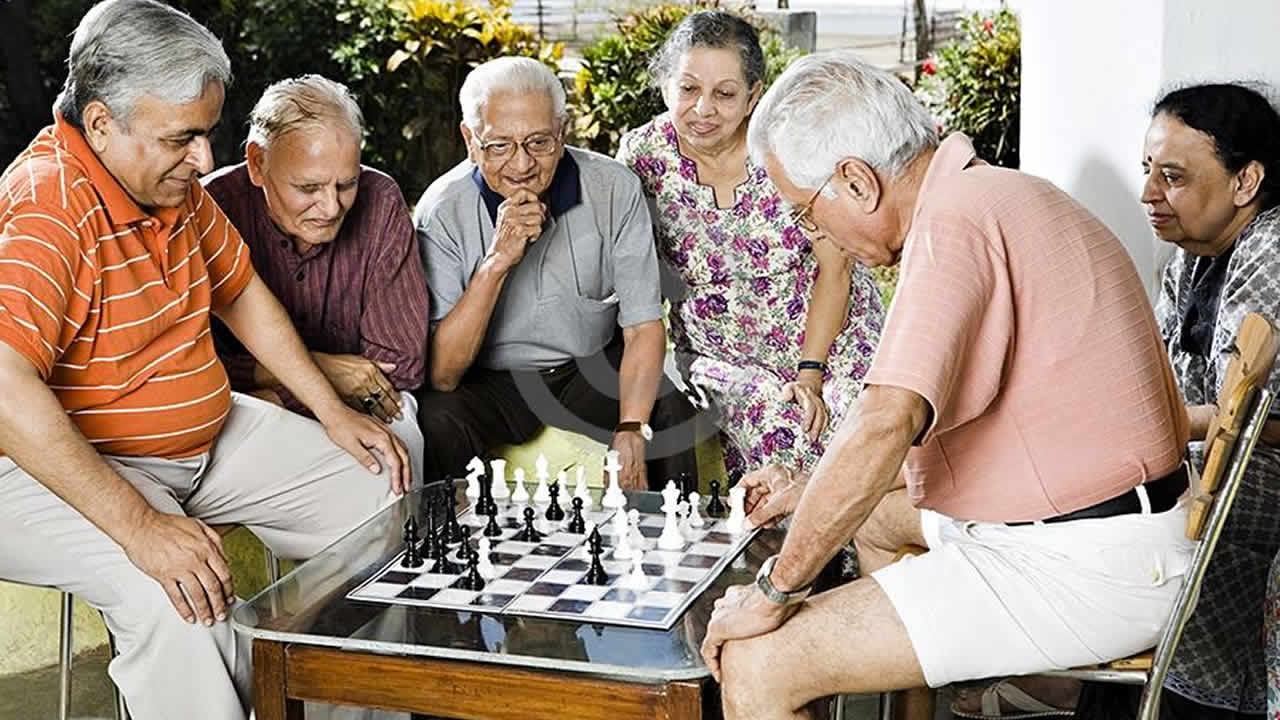
Earlier this week, AARP released its 2018 Aging Readiness and Competitiveness (ARC) research examining how different countries like Australia, Chile, Costa Rica, Lebanon, Mauritius, the Netherlands, New Zealand, Norway, Singapore, and Taiwan are preparing themselves to face the challenges and opportunities presented by the aging population.
The report clearly demonstrates that Mauritius is the leading African country to identify aging as a critical issue for the health and competitiveness of its society and its economy. It is mentioned that Mauritius has embraced international best practices by defining a holistic approach to aging policy that reflects the unique resources and needs of its population. “Today’s older adults in Mauritius are fortunate to live in a country with a long tradition of social support, universal pension, free quality health care, and innovative programs focused on taking care of the generation that helped build the country. Multiple programs offer opportunities for social connection, a sense of community, and leisure. The government is also beginning to address the growing prevalence of dementia and the need for a more robust system for long-term care, and examine workforce participation among older adults.”
Furthermore, the report illustrates that people in Mauritius enjoy financial stability with the combined assets of a universal pension starting at age 60 and earnings-related pensions beginning at age 65, but the country’s accelerated pace of aging is beginning to challenge the sustainability of the system. “The country became an aging society in 2008, crossing the threshold of 7 percent of its population over age 65, and is projected to become an aged society in just five years, with 14 percent of its population 65 and older. For perspective, it took the United States more than 50 years to make the same demographic transition.”
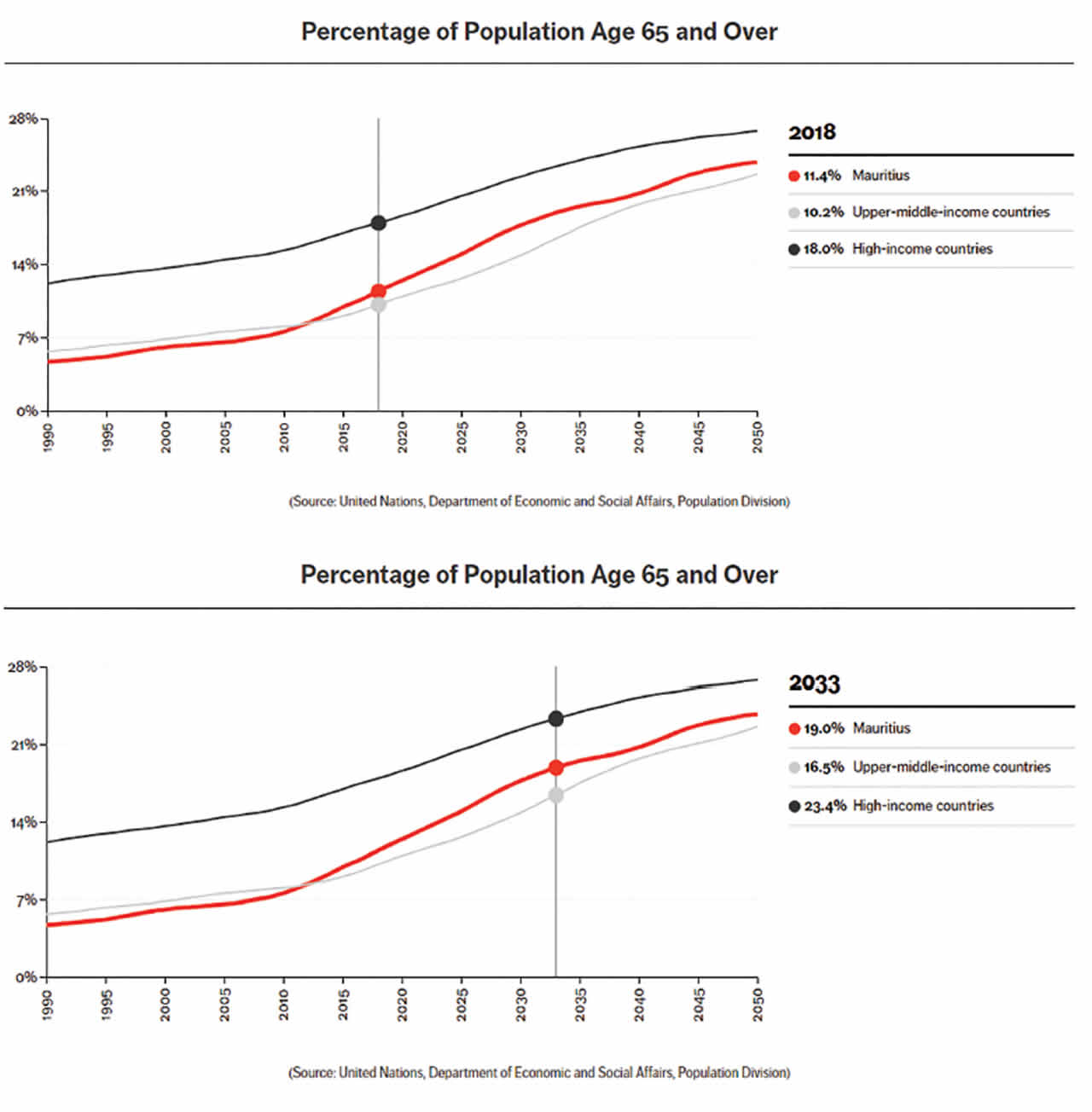
Ecosystem for Policy and Social Innovation
Today, the government’s proactive approach to recognizing its changing demographics and the innovative efforts from government and NGOs are helping older adults to live happier, more productive and healthier lives, highlights the report. “Often operating with Government, international organization, or corporate support, NGOs represent another key driving force for innovation among older adults.”
According to this recent report, as compared to other countries both regionally in its income group and globally, Mauritius stands out as an effective, open, and stable government. “The World Bank ranked it second in Africa for government effectiveness, political stability, regulatory quality, and rule of law in 2016. The country is also a world leader in ease of doing business, scoring 25th globally and third among all upper-middle-income countries. As part of a broader effort to diversify and grow its economy, Mauritius has sought to inculcate a culture and system that facilitates entrepreneurial endeavours and innovation.”
The report adds that “Mauritius’ outward engagement through enduring bilateral relationships and work with international institutions has facilitated both funding and the transfer and adaptation of successful programs to the country. In addition to the country’s historic ties with France and the United Kingdom, Mauritius is actively involved in international initiatives on aging, adopting the Madrid International Plan of Action on Aging of 2002 and, in 2008, adopting a new policy that reoriented its aging focus from a welfare approach to one that emphasized development and active aging.”
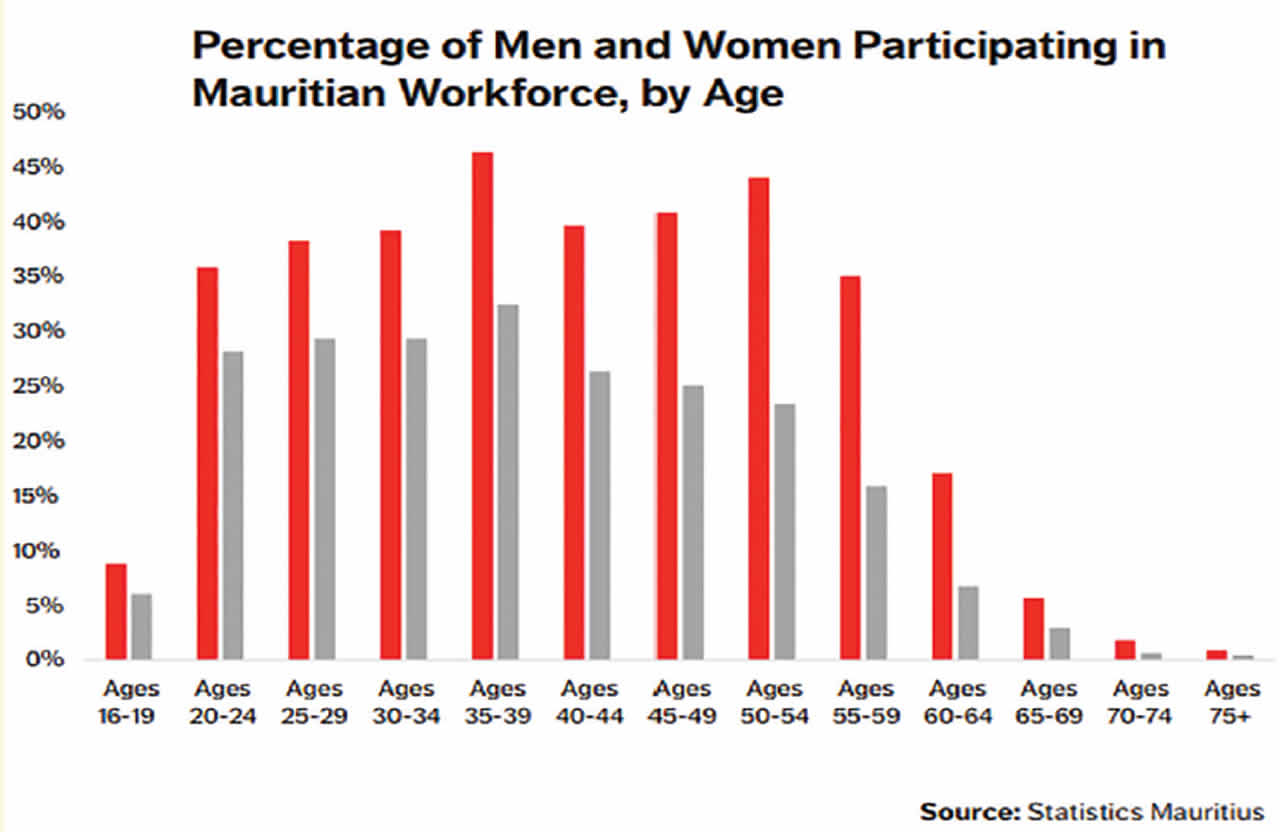
Productive Opportunity
The report indicates that active efforts to research workforce participation among older people in Mauritius are just beginning. “In 2018, the government established the National Productivity and Competitiveness Council (NPCC), launched a survey titled The Ageing Workforce: Productive Opportunity IV Productive Opportunity IV Ecosystem II Ecosystem for Policy and Social Innovation II Productive Opportunity small innovative economies: Mauritius 17 Challenges and Opportunities for Mauritius, to understand the current reality and develop a strategic action plan for the future. Though the survey has not yet been completed, its focus reflects a clear understanding that Mauritius’ aging population is a critical resource for the country’s continued economic competitiveness.”
Additionally, it is highlighted that in the next 20 to 30 years, “there won’t be people in Mauritius that will replace all those who are going to retire,” said Deepak Balgobin, NPCC’s Executive Director. “The survey brief argues that the climate will require innovation to adapt effectively to aging. In addition to the NPCC, the government’s National Economic and Social Council, chaired by the Prime Minister and involving trade unionists, private companies, and government, is making the issue of an aging workforce a priority.”
The International Monetary Fund in 2015 concluded that raising the universal pension eligibility age would be more fiscally responsible by decreasing pension expenditure and would also encourage older adults in Mauritius to work, underscores the report. “It emphasized that 48 percent of basic retirement pension money goes to the wealthiest 40 percent of Mauritius’ population and was therefore poorly targeted, and that increasing workforce participation among older adults, in itself, would help temper the financial burden on the pension system.”
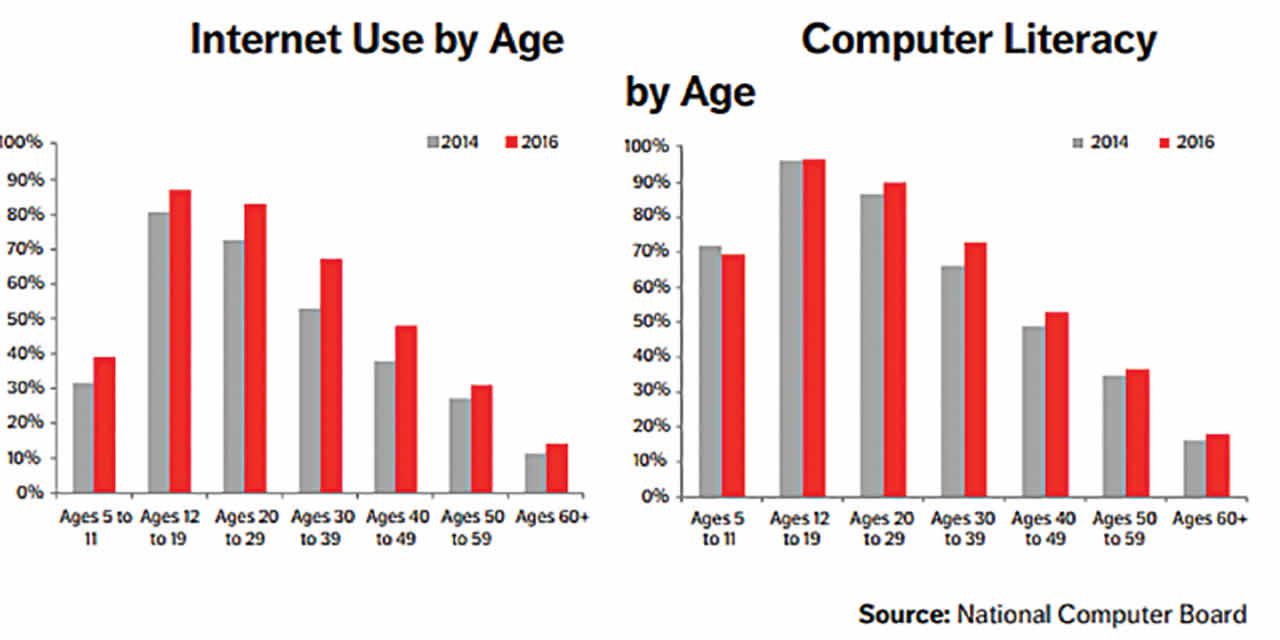
Technological Engagement
One sector of the report also elaborates on digital literacy of adults. It is stated that in recognition of the need for tailored, focused engagement with older adults, the National Computer Board has drawn on a resource developed specifically to reach other underserved groups: Cyber Caravans. The computer-equipped and internet-connected buses have been operating since 2000, successfully bringing ICT to underprivileged communities, including older adults. “By the end of 2017, Cyber Caravans trained 2,491 older adults in ICT Awareness and IC3 courses. Working in cooperation with the Council to develop a program specific to the interests and needs of older adults, in 2018, Cyber Caravans began to make weekend visits to the country’s SRCs, offering multiple classes a day to groups of 10 older adults at a time. Though the program is government run, it has been independently funded with support from Microsoft, Mauritius Telecom, The Information & Communication Technologies Authority, and the United Nations.”
Health Care and Wellness
Older people in Mauritius are living healthily longer, driven in large part by a long-established, high-quality public health care system, highlights the report. “Older adults’ life expectancy (LE) and healthy life expectancy (HALE) have both grown significantly in Mauritius in recent years. As of 2016, at age 60 one could expect to live another 20.7 years, 15.9 of which would be in good health. According to a 2015 survey, an estimated 265,000 people between the ages of 20 and 74 were affected by diabetes, which is equivalent to 20.5 percent of that population. The most recent statistics from the World Alzheimer Report of 2009 estimates between 4,000 and 7,000 people in Mauritius suffer from Alzheimer’s disease.”
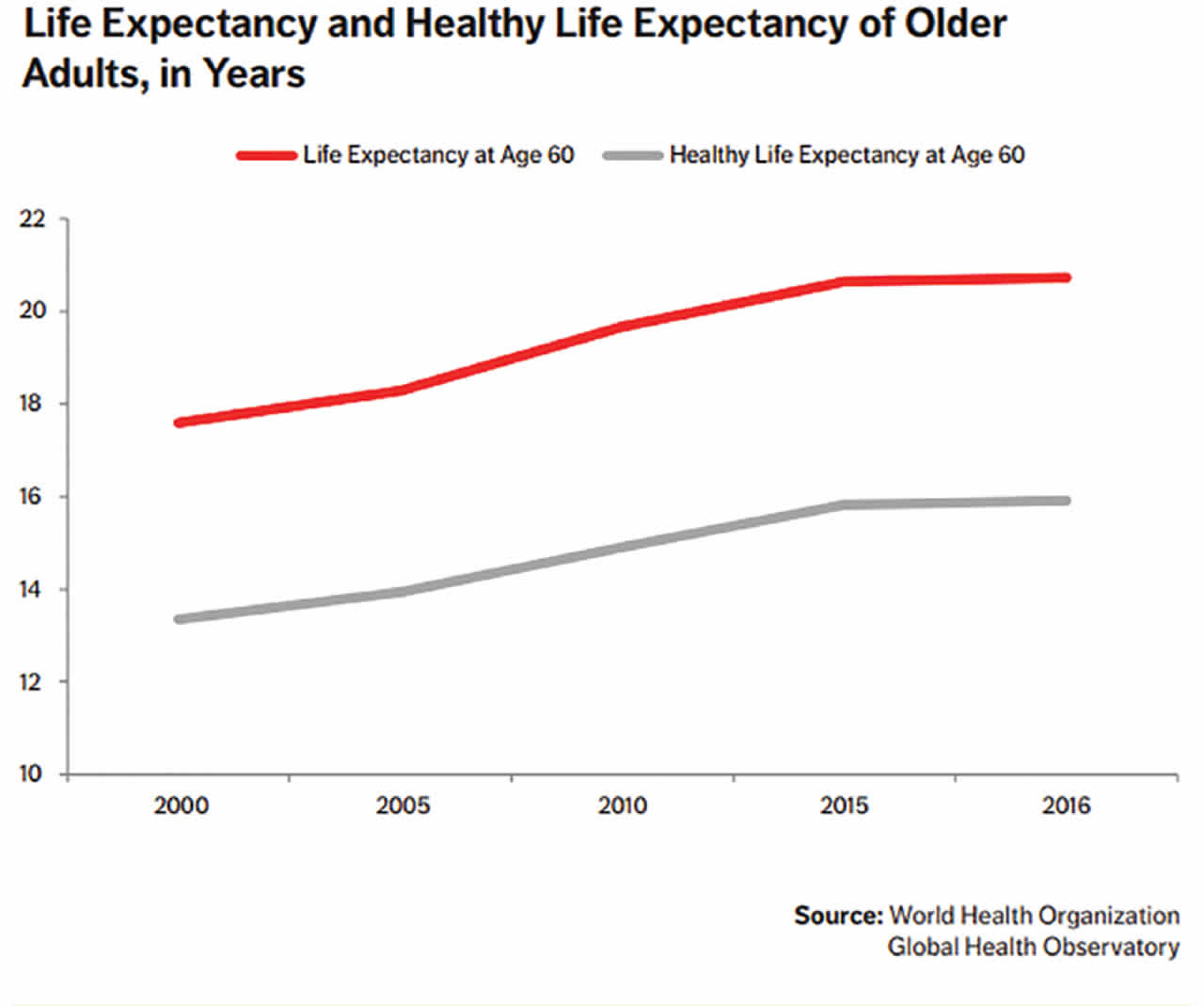
Community Social Infrastructure
Similar to many upper-middle-income countries, Mauritius is rapidly aging while simultaneously undergoing other significant structural changes in its economy and society, including a high rate of emigration among educated, working-age people, that is shrinking the country’s overall population, underlines the recent report. “For older adults, the speed and scale of the country’s economic growth has brought with it three key changes: a shift in family structure, a younger generation pursuing more structured and time-consuming work in new industries, and more commonplace higher education that enables a growing number of younger people to emigrate for work or further study.”
While intergenerational living remains common, Mauritius is undergoing a rapid change in family structure, which is having a significant effect on its older population, underlines the report. “According to a 2016 government report on aging, Mauritius is dealing with two key challenges in tandem as its population ages: the irreversible breakdown of the extended family and increased life expectancy.”
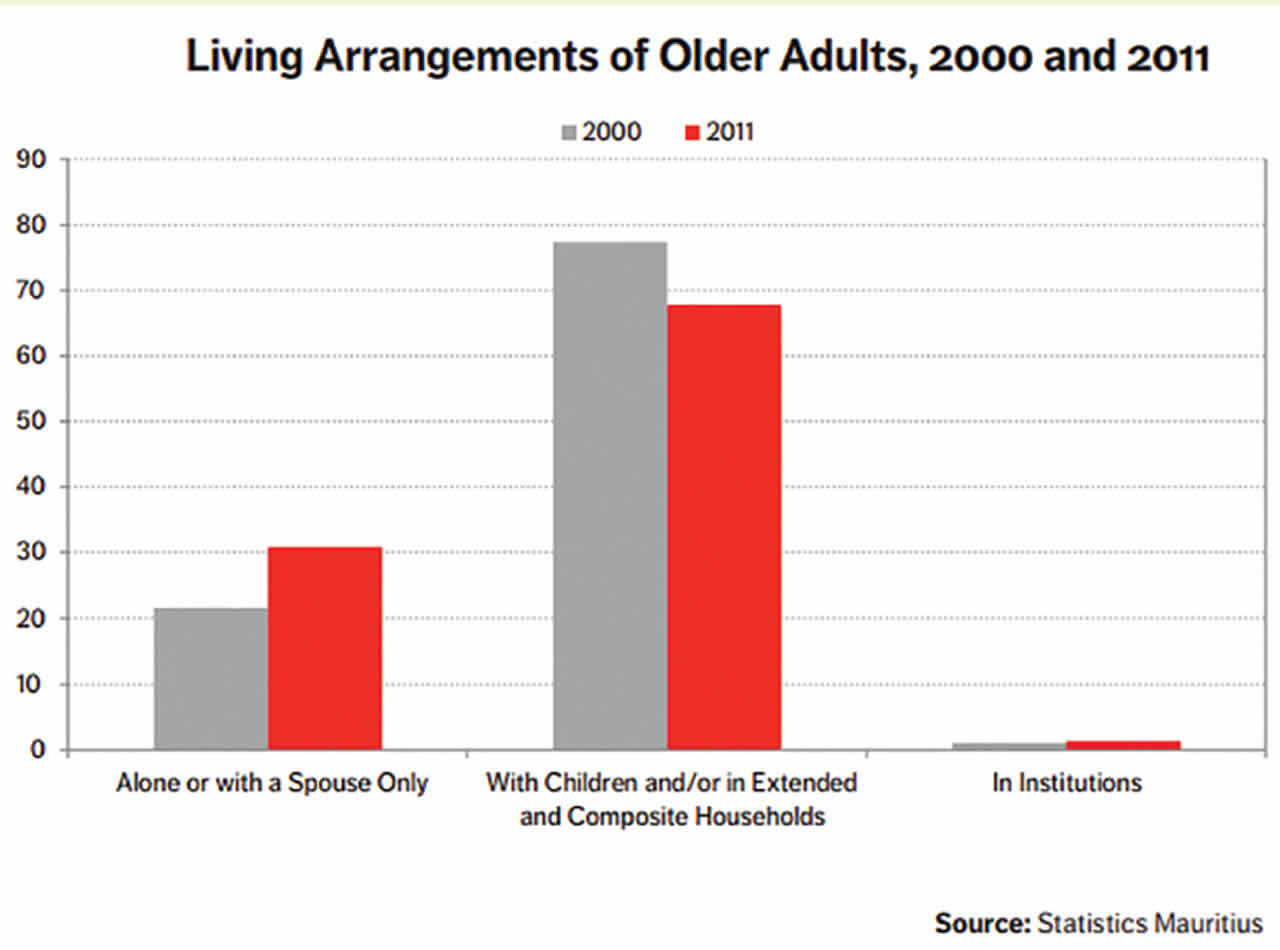
 J'aime
J'aime













